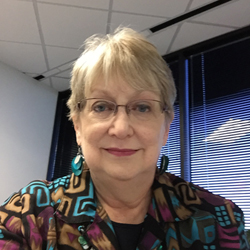Rowlett resident Rhonda Jenkins did not have much hope in 2005 when she was diagnosed with metastatic breast cancer. The disease had spread to her liver, lungs and bones and she was told that she probably had three or four months to live. Her cancer type was an aggressive form known as HER2-positive.
Eleven years later, Jenkins is enjoying life, feeling good and working full time. She credits a drug called Kadcyla that she began receiving in a 2009 clinical trial. It was approved in 2013.
“I’ve been told by my doctor that I was a big part in getting early approval and that makes me feel good,” Jenkins said.
Her life is back to normal now except for receiving treatments every three weeks. She added that they don’t want to stop treatments because once the cancer has spread, it’s never really gone. Some of the scans have shown very small spots, but they were gone on the next scan.
Jenkins, a wife and mother, noticed a lump under her arm in 2005. She got it checked in May and was told to have it checked again in Sept. By that time, the lump had become painful. At the Sept. appointment she had another mammogram that looked normal.
Jenkins didn’t feel comfortable and became her own advocate. She immediately went to her primary care physician’s office and told the receptionist she had to see the doctor right away.
“It kind of went against my personality to stand up for myself like that,” she said. “I didn’t have an appointment. I just said I had to see the doctor right then.”
Soon after, she got the cancer diagnosis and began treatment. Compared to Kadcyla, the original treatments she received were nearly unbearable.
“The other treatments made me feel like I’d been hit by a truck,” Jenkins said
Kadcyla does not make patients feel so bad and, after losing her hair twice, she’s happy that it doesn’t have that side effect.
Aside from physical issues, there were emotional ups and downs. Jenkins’ husband, who also has health problems, helped her fight.
“Five weeks into the strong weekly chemo, I wanted to discontinue treatments. My husband told me all I had to do was live long enough until they find a cure. He has been such an encouragement,” she said.
There is a marked difference in the way Jenkins lives now.
“I’ve heard people say that getting cancer was the best thing that ever happened to them and I understand now,” Jenkins said. “It brought me closer to my family and taught me not to sweat the little things. Things that drove me crazy before are now unimportant. I’ve learned to enjoy life more.”
“After being told 11 years ago that I might have three or four months to live, I’m really just now realizing, ‘hey I think I’m going to live,’” Jenkins said. “I’m interested in redecorating the house now, getting new clothes, the normal things.”
Her advice to other patients is to be their own advocate; to take good care of themselves during treatment; and force themselves to get up out of bed.
“That was a big struggle for me,” she said. “You’ve got to get up, do for yourself as much as you can and keep fighting no matter how bad you feel.”
She also said that people should pursue their dreams, be the best person they can be and not put things off because no one knows how much time they have.
She laughed about a phase she went through a few times where she gave away possessions because she thought her life was nearly over.
“I had to buy several new sewing machines because I kept giving them away,” she said.
Jenkins wants people to know that cancer, even at stage 4, isn’t necessarily a death sentence any more.


